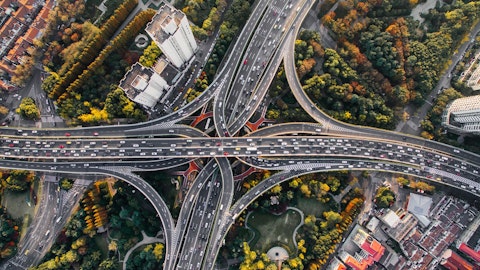Cementos Pacasmayo S.A.A. (NYSE:CPAC) Q2 2023 Earnings Call Transcript July 21, 2023
Operator: Good day, ladies and gentlemen. Welcome to Pacasmayo’s Second Quarter 2023 Earnings Conference Call. [Operator Instructions]. I would now like to introduce your host for today’s call, Mrs. Claudia Bustamante, Sustainability and Investor Relations Manager. Mrs. Bustamante, you may begin.
Claudia Bustamante: Thank you, Jenny. Good morning, everyone. Joining me on the call today is Mr. Humberto Nadal, our Chief Executive Officer; and Mr. Manuel Ferreyros, our Chief Financial Officer. Mr. Nadal will begin our call with an overview of the quarter, focusing primarily on our strategic outlook for the short and medium term. Mr. Ferreyros will then follow with additional commentary on our financial results. We’ll then turn the call over to your questions. Please note that this call would include certain forward-looking statements. These statements relate to expectations, beliefs, projections, trends and other matters that are not historical facts and are therefore subject to risks and uncertainties that might affect future events or results. Descriptions of these risks are set forth in the company’s regulatory filings. With that, I’d now like to turn the call over to Mr. Humberto Nadal.
Humberto Nadal: Thank you, Claudia. Welcome, everyone, to today’s conference call, and thank you for joining us today. This quarter, we experienced some demand-side challenges as heavy rains during March and April caused a decrease in demand. Since May, we have seen a consistent decrease in our cement daily shipments, which gives us the confidence to believe that the second half of the year should be much stronger in terms of demand. It is also important to note that even though revenues were down 12.1% in the second quarter when compared to the second quarter of last year, EBITDA margin reached 25.5%, an increase of 1.5 percentage points year-over-year. This is a very clear indicator of how we are maximizing profitability by striving for efficiencies in this complex demand environment.
I would like now to focus on a remarkable event that happened this quarter. As we have mentioned before, last year we launched the EcoSaco, a new technology that allows the cement bag to disintegrate completely within the concrete mix achieving 0 waste. This is a significant innovation in a country like Peru where most cement is still sold in bags, but it’s also a challenging one. Most foremen have learned how to build empirically through experience that is passed on from generation to generation. Innovating in this context is indeed difficult. Moreover, many of these families put their life savings in these houses. They need to be absolutely confident that the quality properties and the final product will not be affected at all by this new technique.
And this is precisely why a strong marketing campaign is so important. The EcoSaco innovation obtained the Gran Effie this quarter as well as a Gold Effie in the Innovation In Product Marketing category and a Silver Effie in the Positive Change In Environment category. The Effie Awards are a symbol of outstanding achievement recognized worldwide that honors all types of effective marketing. It is truly remarkable that a cement company with original scope such as Pacasmayo obtained the greatest price that is usually awarded to companies with a national presence and in the mass consumption segment. We are indeed very proud of this outstanding achievement, especially because the product truly represents our DNA. The effective marketing of this innovation is key to the achievement of its full potential as a 0-waste product as well as [indiscernible] change in consumers’ mindset towards eco-friendly and more sustainable products.
As we have mentioned before, we have been producing cement with a lower clinker factor for over 25 years. Pacasmayo’s portfolio is mostly made up of blended cement, which have a lower impact on the environment since they use less clinker in the production. Currently, over 85% of our cement sales come from blended cement with an average of 22% less clinker as regional important cements, achieving significant savings in CO2 emissions in production. However, we consider that this is not enough. We are voluntarily, and I repeat, voluntarily committed to a reduction of 20% in our emissions by 2030, which means we have to decrease our average clinker factor to at least 68% by the decrease of 3.5 percentage points compared to our 2022 average. We continue innovating to find alternative materials that can deliver the same or even better quality cement with an even lower carbon footprint.
After speaking about sustainability, I would like now to focus on other fundamental pillars of our strategic model, digital transformation. This is no doubt a popular term these days, but one has to be at the center of those businesses that truly want to be at the forefront. Changes in purchasing behavior of consumers and open access to digital technologies are catalysts of this new wave of digitalization. These trends create both opportunities and risks as they challenge the status quo. In this changing world, with ever more demand in consumers accreted the transformation strategy that seeks to guide and accelerated the company towards its vision with a focus on collaboration and cost of innovation is even more relevant. And although we have talked about this before, we want to talk about the great milestone for Pacasmayo as we have taken the first step towards becoming a fully data-driven organization.
We now have a clear strategy for data management. We have established a data and analytics committee to both prioritize and foster initiatives, we have now funded the first agile unit within Pacasmayo. And we are designing and making available and consistent of corporate data through our own data lake. And finally, developing case studies to lead and implement data and analytic solutions that add value to our businesses. We are aware that we still have a long way to go, but we believe we are now better prepared to face the future and will continue to promote flexibility, agility and innovation through our business model and culture to continue along this path. Finally, I would like to briefly update you on the status of our Pacasmayo plant optimization.
We are very pleased to inform that the kiln number 4 is now operational and ramping up its production and expect to reach its full capacity during the next couple of weeks. This newer technology will allow us to save 15% in the consumption of kilowatts per hour per ton of clinker and an estimated reduction of 30% in the consumption of the kilo calories per ton. We were able to deliver this project on time with an overall investment of $80 million or original 600,000 metric tons of clinker per year. I will now turn the call over to Manuel to go into a more detailed financial analysis.
Manuel Ferreyros: Thank you, Humberto. Good morning, everyone. As Humberto mentioned, our second quarter 2023 revenues were affected by the temporary decrease in demand, reaching PEN 442 million, a 12.1% decrease when compared to the same period of last year. Gross profit also decreased but significantly less, achieving PEN 152.6 million, a 3.5% decrease when compared to the same period of last year, mainly affected by decreased sales partially offset by lower costs from decreased use of imported clinker and lower coal costs. Consolidated EBITDA was PEN 112.6 million this quarter, a 6.6% decrease when compared to the second quarter of last year. However, it is important to note that the EBITDA margin was 25.5%, a 1.5 percentage point increase when compared to the second quarter of last year.
For the first 6 months of the year, results followed a similar trend. Revenues decreased 10.3%, gross profit only 3% and EBITDA 5.9%, when compared to the same period of 2022. EBITDA margin during this period was 25.3%, an improvement of 1.2 percentage points compared to the same period of last year. Turning to operating expenses. Administrative expenses for the second quarter of 2023 increased 6.2% compared to the same period of last year and 7.2% during the first 6 months of the year when compared to the same period of 2022, mainly due to the increase in wage in line with inflation as well as an increased donation as a result of the cyclone Yaku. Selling expenses decreased 7.6% in the second quarter of 2023 and 2.4% in the 6 months of 2023 compared to the same period of last year, respectively, mainly due to the increase in personnel expenses basically because of variable salaries in line with decreased sales as well as a decreased advertising and promotion expenses.
Moving on to the different segments. Sales of cement decreased 7.4% this quarter when compared to the same period of last year and 5.8% during the first 6 months when compared to the first 6 months of 2022. This was mainly due to the temporary decrease in demand because of the flooding and landslide caused by Cyclone Yaku and intense rainfall afterward. We have started seeing a recovery in sales volume and expect the second half of the year to show this improvement. However, gross margin increased 2.3 percentage points in the second quarter of 2023 when compared to the second quarter of 2022 and 1.7 percentage points during the first 6 months of the year when compared to the same period of last year, mainly due to a reduction in the use of imported clinker and lower cost of coal.
During this quarter, concrete, pavement and mortar sales decreased 30.6% when compared to the same period of last year, mainly due to a significant slowdown in sales volume for private and public works. New regional authorities took office this January and almost immediately had to deal with the Cyclone Yaku and its aftermath. So have only recently begun to look into investment possibilities. We believe that the second half of the year should bring along more public infrastructure investments, especially considering that preventive works for the predicted El-Nino in 2022 — in 2024, which should begin as soon as possible. Gross margin decreased by 9.5 percentage points in the second quarter of 2023 when compared to the same period of last year, mainly due to lower dilution of fixed costs because of the decrease in sales volume.
However, it is important to note that we have worked very hard in trimming our costs, and we are certain that once volume improves, we should be able to capitalize our own margins. Results for the first 6 months of the year were similar. Revenues decreased 26.5% and gross profit decreased 5.5 percentage points when compared to the same period of previous years. Sales of precast materials during the second quarter of 2023 and the first 6 months also decreased, affected by the low levels of public investment and heavy rains. Net profit decreased 9.4% this quarter and 7.2% during the first 6 months of the year when compared to the second quarter and the first 6 months of last year, respectively, mainly due temporary decrease in sales. In terms of debt, our net debt-to-EBITDA ratio was 3.3x.
To summarize, this quarter results show our ability to manage costs and seek for efficiencies during lower demand times. This makes us confident that we will be able to maximize profitability as soon as the market starts recovering. Operator, please, can we open to questions.
Operator: [Operator Instructions].
See also 50 Largest Economies in the World Ranked by PPP and 20 Countries with the Highest Rate of Dementia.
Q&A Session
Follow Cementos Pacasmayo Saa (NYSE:CPAC)
Follow Cementos Pacasmayo Saa (NYSE:CPAC)
Receive real-time insider trading and news alerts
Humberto Nadal: Operator, since we have no questions on the floor, we’re going to go to the questions in the — on the web.
Operator: Yes. Perfect.
Claudia Bustamante: I’ll start with a question from Francisco Suarez. Congrats on advancing in your production integration, namely improving clinker capacity. Two questions: the first one, any plans to add a new grinding unit in your Pacasmayo plant to reduce further kilowatt hour per ton? And the second one, can you tell us on spending related to reconstruction efforts in Northern Peru and the creation of resilient infrastructure to cope for more climate volatility in the future?
Humberto Nadal: Thank you, Francisco, for your comments. On your two questions, we have no intention of adding grinding capacity. As a matter of fact, we have more than enough. As you well know, I mean, we always want to lower clinker factors or usually our grinding capacity is ahead of our clinker capacity. At this point, as a company, can dispatch 5 million tons. And the two grinding facilities, which is grind number six and number seven in Pacasmayo, they were built around 2009, 2010 so are pretty modern. So the question [indiscernible]. And the second question…
Claudia Bustamante: Infrastructure.
Humberto Nadal: Infrastructure. Yes, Yesterday, President Boluarte signed official recreation of the national authority of our infrastructure, which is, I think, a huge step in the right direction. This is a very interesting position because it will not be politically appointed. It has a lot to do with a long-term vision. So I’m sure with that and with all the things that we are seeing over the last 3, 4 weeks, or the authorities preparing for El-Nino, we are very confident that the second semester will show better numbers in terms of volumes. As a matter of fact, if you see our daily sales, we’ve been — we have seen a consistent improvement over the last 3 or 4 weeks, and I think this will be reinforced by the spending of the local and national authorities in the coming months.
Claudia Bustamante: The next question is about — from [indiscernible]. How much is the cost of coal in — as a percentage of your own clinker?
Manuel Ferreyros: The percentage of the cost of the coal, it’s approximately 14%.
Claudia Bustamante: And then regarding the EcoSaco, is there any difference between the gross margin of this product with other products? And also what’s the share of the EcoSaco within our…
Manuel Ferreyros: No, basically, there is no additional cost — well, additional cost is minimum because the only difference is the cost of the bag. So it’s basically the same — cement.
Claudia Bustamante: And then the next question comes from 3 questions. So first, Pacasmayo has dispersed PEN 160 million in the first half, which is well above historical levels. Could you guys give me more color regarding the main investments the company has made so far in 2023 that justify the increase?
Humberto Nadal: Yes. I think the fundamentally is, I mean, clinker number 4, like I said in my speech, we spent around $80 million to put it into production. And this is an extraordinary CapEx event. After that, I mean, we have no — nothing in the horizon except the normal sustaining CapEx.
Claudia Bustamante: The second question. After the full ramp up of kiln number 4, what can be expected to be sustainable margins in the medium to long term?
Manuel Ferreyros: The sustainable EBITDA margin in the medium term should be around between 26% and 27% — sorry, but it will depend on how much…
Humberto Nadal: How much ready mix.
Manuel Ferreyros: How much ready mix we sell. If the ready mix increases, obviously, the margin goes down. But at the absolute EBITDA that it may goes up.
Claudia Bustamante: And then finally, we’ve [indiscernible] to affect the country by the end of the year. So could we expect better cement demand in the third quarter as a result of preventive public and private investment improvement?
Humberto Nadal: Absolutely. I mean we’re already seeing that over the last weeks, regional government is trying to get up to par with El-Nino preventive measures. So yes, I think whether El-Nino happens or not is something we don’t know. We are not clear at this moment or the strength of it, we’re not clear, but we are seeing a lot of investment in terms of preventive works.
Claudia Bustamante: Short-term debt seems high for this year. Cash in hand doesn’t seem enough. Please could you explain a little more about how are you going to overcome it?
Manuel Ferreyros: Yes. Basically, the short term that we’ve acquired has been for the Pacasmayo’s new kiln, but this is a very small amount. It’s only PEN 100-and-something million. And we will — should prepaid during the next 6 months.
Claudia Bustamante: That’s all the questions we have from the webcast. So I’ll hand it over to Humberto for closing remarks.
Humberto Nadal: Thank you, Claudia. Pacasmayo has been operating in Peru for over 65 years. And throughout this time, we have seen demand periodically fluctuate affecting our short-term financial results. However, our strategic model allows us to be ready to take on the market when conditions improve, focusing on those things that generate long-term value. We strongly believe the successful adoption of digital transformation and a culture of innovation and sustainability are those drivers that will lead us toward sustained value generation. The success of these measures is highly reliant on people’s compromise and active participation, and we are absolutely confident that we have the best talent to achieve it. I would like to thank everybody for the renewed interest in our company. And as always, Manuel, Claudia and myself will remain here should you have any further questions. Thank you very much and have a great weekend.
Operator: Thank you, everybody. This does conclude today’s conference. You may disconnect your phone lines at this time, and have a wonderful day. Thank you for your participation.
Follow Cementos Pacasmayo Saa (NYSE:CPAC)
Follow Cementos Pacasmayo Saa (NYSE:CPAC)
Receive real-time insider trading and news alerts





